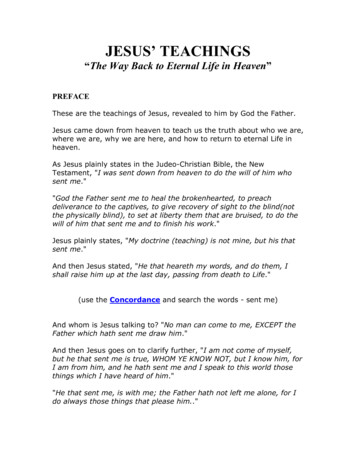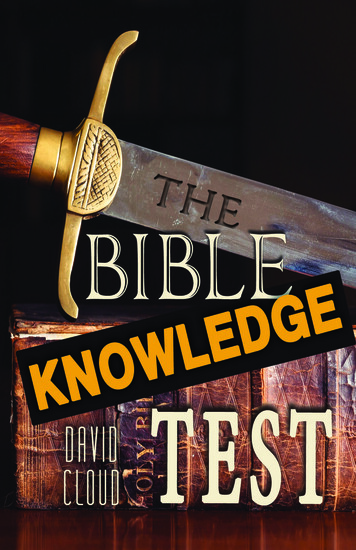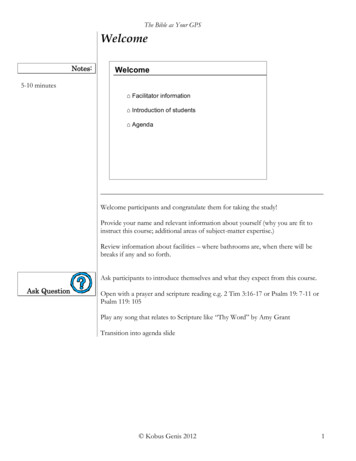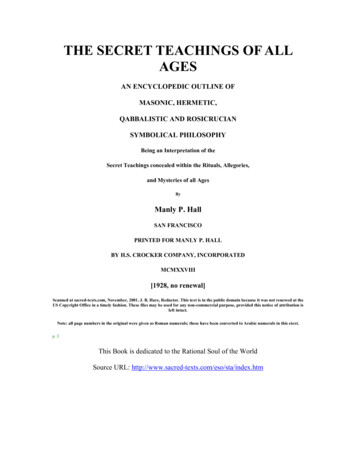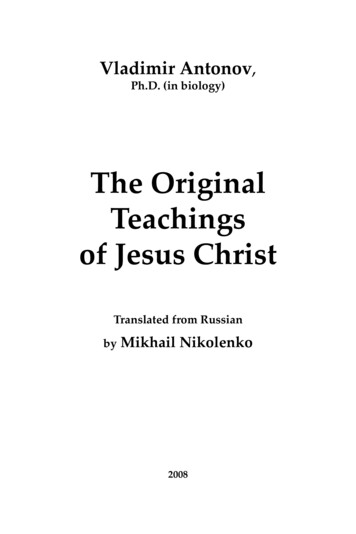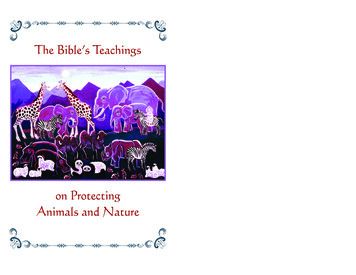
Transcription
The Bible’s Teachingson ProtectingAnimals and Nature
IntroductionThe Bible and the JudaicChristian tradition teachand command us to treat animalswith kindness and respect. Themassive abuse and suffering legallyinflicted on billions of animalsevery year is a clear violation ofthe teachings of our religious faithand cannot be justified by anyperson of faith and decency.The people for whom the Biblewas written thousands of years agowere intimately familiar withwildlife and domestic animals,especially the practice of raisingcattle and other animals. The Biblecontains strict rules governing thetreatment of farmed animals, andindeed all of God’s creatures, whichwere designed to prevent anyunnecessary pain and suffering.Modern day animal agricultureviolates core Christian values. Itwipes out entire populations andspecies of wildlife, confines hugenumbers of animals in miserableconditions on factory farms, damages the environment, squandersscarce resources, and harms thehealth of people.The Ten Commandments:Do Not OverworkAnimalsThe Mosaic Law in the HebrewScriptures forbids overworkinganimals and requires that peoplehelp stray and lost creatures. Manyinjunctions are clearly written forthe sake of the creaturesand not the owners.The Law requires thatone help animals whobelong to enemies towhom one owes no obligation, as well as thoseof friends. One maynot “pass by” ananimal in distress: “If youmeet yourenemy’s ox orhis ass goingastray, you shallbring it back to him.If you see the ass of one2who hates you lying under its burForbidding Crueltyden, you shall refrain from leavingto Animalshim with it, you shall help him tolift it up” (Exodushe Bible forbids23:4-5).cruelty toThe Ten Comdomestic animals.mandments specifiIt would be harsh tocally mentions thatprevent the ox fromA righteous mancattle and donkeyseating while workmust not be workedhas regard for the lifeing, and consequenton the Sabbath. Inof his beast.ly Deuteronomythe twenty-third25:4 reads, “Youchapter of Exodus,Proverbs 12:10shall not muzzleseveral animal-proan ox when it treadstection statutes areout the grain.”given by God toMoreover,Moses: “Six daysDeuteronomy 22:10you shall do yoursays, “You shall not plow with anwork, but on the seventh day youox and an ass together.” Pairingshall rest; that your ox and youranimals of different sizes andass may have rest ” (Exodusstrengths would place a strain23:12). Similarly, “the seventhon the weaker of them, or perhapsday is a sabbath to the Lord youron both.God; in it you shall not do anyContrast these ancient lawswork, you, or your son or yourthat sought to reduce animal sufox, or your ass, or any of yourfering with modern-day factorycattle” (Deuteronomy 5:14).farming practices. Today, for examGod also commands that everyple, farmers take calves raised forseventh year one should not sowveal from their mothers at birth,or harvest the land, the vineyards,deny the calves their mother’sand the olive groves. They shouldmilk, and deliberately deprive thebe allowed to “rest and lie fallow”calves of iron. Farmers often keep(Exodus 23:11). God commandsthe calves their entire lives inthat what grows naturally in thecrates so narrow that they cannotfields left fallow in the seventhturn around. These circumstancesyear shall be for oneself, one’s serrender the calves’ muscles soft andvants, one’s guests, and “for youranemic, making the flesh tendercattle and also for the beasts thatand lightly colored. Such treatare in your land all its yield shallment is incompatible with thebe for food” (Leviticus 25:4-7).Bible’s teachings.T3
A Righteous ManHas Regard for the Lifeof His Beasttwelve tribes of Israel – to say whatfate would befall them, Simeon andLevi were castigated and chastisedfor crippling oxen, among otherthings (Genesis 49:6-7).Proverbs 12:10 declares, “A righteous man has regard for the lifeof his beast, but the mercy of theThe Beasts of the Fieldwicked are cruel.” This importantShall Be at Peaceverse suggests a Biblical division ofwith Theepeople into two distinct types –those who are “righteous” and justhe Book of Psalms relates thatare kind to their animals, and thoseGod’s goodness and compaswho are “wicked” and are cruel tosion are not reserved just forcreatures under their care.humans but extend to all of God’sThe story of Rebekah at thecreatures. Psalm 36:6-7 praiseswell stresses the importance ofGod, saying “man and beast thoukindness to animals as a personalsavest, O Lord. How precious isattribute. In this account, thethy steadfast love, O God! Thepatriarch Abraham,children of menseeking a wife fortake refuge in thehis son Isaac, sendsshadow of thyhis trusted servantwings.”out to search for aPsalm 145 reitersuitable woman.The Lord is good to all,ates this theme ofThe servant choosesand his compassion is over God’s concern forRebekah after sheall God’s creatures:all that he has made.demonstrates a kind“The Lord is gooddisposition by drawto all, and his comPsalm145:9ing water not justpassion is over allfor him but also forthat he has made.his camels thou satisfiest(Genesis 24:19).the desire of everySimilarly, 2 Samuelliving thing” (9, 16).Chapter 12, GodSimilarly, God’s explanation touses the sad story of the inexcusJonah for why God elected not toable killing of a family’s beloveddestroy Nineveh reflected God’spet lamb to show King David theconcern for animals. The “greaterror of his ways.city” contained 120,000 peopleWhen Jacob called together his“and also much cattle” (Jonahtwelve sons – representing the4:11).T4God’s Ideal Includes Peacewith AnimalsThe book of Hosea (2:18) suggests that God would make apact with the animals to give themsafety from being hunted and persecuted by abolishing the instruments of their destruction: “And Iwill make for you a covenant onthat day with the beasts of thefield, the birds of the air, and thecreeping things of the ground; andI will abolish the bow, the sword,and war from the land; and I willmake you lie down in safety.”The Book of Job 5:23 describesas an ideal a day when humankindwill be at peace with nature: “Foryou shall be in league with thestones of the field, and the beastsof the field shall be at peace withyou.”Isaiah 11:6-9 eloquently depictshow the animal kingdom will beincluded in the blessings of peaceon earth when it is achieved: “Thewolf shall dwell with the lamb,and the leopard shall lie downwith the kid, and the calf and theyoung lion and the lion shall eatstraw like the ox. They shallnot hurt nor destroy in all my holymountain: for the earth shall befull of the knowledge of the Lord”.5
Reverence for Lifein the New TestamentThe New Testament containsmany references favorable toprotecting animals and nature. InLuke (12:6), Jesus stresses that Godloves even the lowliest of creatures: “Are not five sparrows soldfor two pennies? And not one ofthem is forgotten before God.”Matthew 10:29 also reports Jesus’belief that God cares for all God’screatures, even those of little monetary value tous. In teachingGod’s infinitewisdom andlove formankind,Matthewquotes Jesus assaying: “Arenot two sparrows sold for a penny? And notone of them will fall on the groundwithout your Father’s will.”In Luke (13:15), Jesus uses theBiblical laws of humane treatmentof animals to justify healing a crippled woman on the Sabbath, saying, “Does not each of you on thesabbath untie his ox or his assfrom the manger, and lead it awayto water it?” Again in Luke, Jesussimilarly justifies healing a manon the Sabbath, saying, “Which ofyou having a son or an ox that hasfallen into a well, will not immediately pull him out on a sabbath6day?” (14:5) And in the Sermon onthe Mount, Jesus speaks of “thebirds of the air”, saying that “yourheavenly Father feeds them”(Matthew 6:26).Interestingly, the NewTestament never depicts Jesus eating meat in his lifetime, not evenat the Last Supper, although ontwo occasions after his death andresurrection the Bible describes hiseating fish.Many Christians see deep significance in the story of Jesusbeginning his life among the animals (Luke2:7). Deniedshelter andlodging by thehumans ofBethlehem inJudea, Maryand Josephwere forced touse a mangerfor Jesus’ birthplace. There, Jesuswas born, presumably in the company of such creatures as donkeys,oxen, cows, and sheep.Jesus’ appreciation for animalsis demonstrated by the repeatedanalogies and references to animals that he used in his teachings.He referred to his followers, andthose who worship God, as sheep,and he compared God’s care forJerusalem with a hen’s concern forher brood. Often in his teachings,Jesus compared himself to suchanimals as the lamb and the dove,known for their innocence, meek-ness, and docility.He often represented animals as beingunder God’s providence, and Jesus’repeated statementsto practice love,mercy, and compassion are consistentwith, and indeedfundamental to, thehumane and preservation ethic.through, and thelowing of cattle isnot heard; for boththe birds of the airI desire mercyand the beasts ofand not sacrifice.the field are gone”(9:10). Similarly,Matthew 9:13, 12:7Habakkuk predicts“ the destructionof the beasts willterrify you, for theblood of men andviolence to theearth, to cities and all who dwelltherein” (2:17). In both cases,The Bible’s Conservationdestroying the land – much as weare doing today to farmland andMessagethe wilderness – brings misery.The Bible accords special reverhe obligation of humans toencefor trees and forests, and onerespect and protect the naturalof the first things the Israelitesenvironment is a theme thatwere commanded to do when theyappears throughout the Bible.“came into” the Promised LandFrequently, the mandate directlywas to plant trees and allow themrelates to the problems we faceto mature before eating their fruitstoday – cruelty to farmed animals,(Leviticus 19:23).destruction of wildlife and habitat,The Mosaic Law contains aand pollution of the land, water,remarkable nature-protection reguand air.lation that forbids the destructionPerhaps the world’s first antiof fruit-bearing trees when wagingpollution law is found inwar against a city (DeuteronomyDeuteronomy (23:13-15), which20:19). Elsewhere the Mosaic Lawforbids contaminating the landsets forth strict and detailed ruleswith human waste. In the booksregarding caring for trees. Forof Jeremiah (9:9-11) and Habakkukexample, Leviticus (19:23-25)(2:17), God warns against destroyorders that fruit trees be left wilding nature and wildlife. Inand unpicked for the first fewJeremiah, God describes “weepingyears in order to give themand wailing for the mountains, andstrength and increase their yield.a lamentation for the pastures ofThroughout the Bible, in stressthe wilderness, because they areing the reverence humans shouldlaid waste so that no one passesT7
Some Biblical scholars see sighave toward the land, thenificance in the fact that God proScriptures impart a strong consernounced each thing God created –vation message, warning againstthe whales, birds, cattle, “everyover utilizing and wearing out natthing that creeps upon theural resources. In Leviticus (25:4),ground,” and the other “beasts ofGod commands that: “in the sevthe earth” – as “good” in itselfenth year there shall be a sabbath(Genesis 1:21, 25). And when Godof solemn rest for the land, a sabreviewed the entire Creation, Godbath rest for the Lord; you shalldeclared it “very good” (Genesisnot sow your field or prune your1:31), perhaps because God hadvineyard.”created a universe of harmony.Also Leviticus (26:3-6) describesPsalm 104 eloquently sums upGod’s appreciation for the land bythe theme of God’s concern forpromising the Israelites that, if theyCreation, praising God for providobey God’s commandments, theing for all of God’s creatures. Itland will reward them: “If you walknotes how we all depend on thein my statutes and observe my comecological systemmandments and dothat God has estabthem, then I willlished, proclaiming:give you your rains“O Lord, how maniin their season, andare thy works!the land shall yieldFor every beast of the forest foldIn wisdom hastits increase, and theis mine, and the cattlethou made them all;trees of the fieldthe earth is full ofshall yield their fruit.upon a thousand hills.thy creatures. And I will giveI know all the fowls of the Yonder is the sea,peace in the land ”mountains: and the wild great and wide,beasts of the field are mine. which teems withGod’s Lovethings innumerable,for Natureliving things bothPsalm 50:10-11 (KJV)small and great. hroughout thethou openest thyBook ofhand, they are filledGenesis, God lookswith good things. with special favor on “the swarmsthou sendest forth thy Spirit, theyof living creatures.” God createdare created; and thou renewest thethem, blessed them, and comface of the ground. May the glorymanded them to “be fruitful andof the Lord endure for ever, maymultiply,” repeatedly characterizthe Lord rejoice in his works ”ing their creation as “good.”(Psalm 104:24-31).T8In the Book of Deuteronomy(8:7-9), Moses describes thePromised Land as an ecologicalparadise, noting its rich and beautiful environment and its “fountains and springs, flowing forth invalleys and hills ” Moses stresses to theIsraelites thesanctity of theland: “a landwhich the Lordyour God caresfor, the eyes ofthe Lord yourGod are alwaysupon it, from thebeginning of theyear to the end ofthe year”(Deuteronomy 11:12).God’s love of the land for itsown sake, not just for humans’benefit, is apparent when Godspeaks to Job from the whirlwind,telling him how God does “bringrain on a land where no man is, onthe desert in which there is noman; to satisfy the waste and desolate land, and to make the groundput forth grass” (Job 38:26-27).The Book of Job tells us thathumans must live in harmonywith nature and seek to learn fromits wise and mysterious ways: “Butask the beasts, and they will teachyou; the birds of the air, and theywill tell you; or the plants of theearth, and they will teach you; andthe fish of the sea will declare toyou. Who among all these does notknow that the hand of the Lordhas done this?” (Job 12:7-9).Human-StewardshipResponsibilitiesNot onlydoes theBible stressthat naturereflectsGod’s gloryand greatness, but theScripturesassert thathumans havebeen given aspecial responsibility to protectand care for the natural environment. Yet ironically, this Biblicalmandate has often been used as alicense to despoil and destroyinstead of an obligation to protectand preserve.Probably no passage in the Biblehas been so misunderstood andmisinterpreted as Genesis 1:26,where God gives humankind“dominion” over nature and animals. This has often been mistakenly interpreted as a synonym forownership, giving humans theright to treat nature and animalsas they see fit. However, sincethere was no violence in theGarden of Eden and since Goddescribed all of Creation as “verygood,” it is much more reasonableto regard human “dominion” as a9
sacred responsibility to be goodstewards of the natural world. Inaddition to caring for and protecting the earth, Genesis 1:28 commands humankind to “replenishthe earth.”In contrast to those who holdthat the earth belongs to humans,in Leviticus (25:23), God proclaims, “the land is mine; for youare strangers and sojourners withme.” Similarly, the Twenty-fourthPsalm relates that the worldbelongs not to humankind but toGod: “The earth is the Lord’s andthe fullness thereof, the world, andthey who dwell therein “ Also,Deuteronomy 10:14 proclaims,“Behold, to the Lord your Godbelong heaven and the heaven ofheavens, the earth with all that isin it ” All living things belong toGod, and God declares in Psalm50:10-11, “For every beast of theforest is mine, the cattle on athousand hills. I know all thefowls of the mountains: and thewild beasts of the field are mine”(KJV).Into Your HandAre They DeliveredThe Bible containsnumerous stricturesagainst wanton or cruelkilling of wildlife anddomestic animals.Ecclesiastes (3:19-21)asserts that humans are10vain to believe that their destiniesdiffer from those of animals: “Forthe fate of the sons of men and thefate of beasts is the same; as onedies, so dies the other. They allhave the same breath, and man hasno advantage over the beasts; forall is vanity. All go to one place;all are from dust, and all turn todust again. Who knows whetherthe spirit of man goes upward andthe spirit of the beast goes down tothe earth?”In numerous places in theBible, God acts toward humansand animals in an equitable way.When God saved Noah and hisfamily from destruction, Godtreated the animals in a similarmanner: “And God rememberedNoah and every living thing, andall the cattle that were with himin the ark” (Genesis 8:1).Genesis 9:8-10 relates that,after the waters of the great floodreceded, God promised a floodwould never again destroy theearth. God made this covenant notonly with Noah and his descendants but also with “every livingcreature that is with you, the fowl,the cattle, and every beast of theearth with you; of all that go outof the ark, even every beast of thethe thesis that God cares deeplyabout animals. The ostensible purearth.” Indeed, God makes no dispose of the sacrifices was to atonetinction between people and anifor sin, so it is reasonable to regardmals in establishing God’sanimal sacrifices as a necessarycovenant “between me and thestep away from theearth” (Genesis 9:12practice of human17).sacrifice (NumbersMany people31:30, 40) on theregard God’s givingroad to abolition ofNoah permission toeat animals as valiWhat does the Lord require all sacrifice.The laterdating humankind’sof you but to do justice,prophets, includingentitlement to treatIsaiah, Hosea,animals as we please.and to love kindness,Amos, Micah, andHowever, killing andand to walk humblyJeremiah, coneating animals camewith your god?demned animalwith a curse – wheresacrifice. For examas previously peopleMicah 6:8ple, Isaiah (1:11-13)and animals haddescribes how Godlived in harmony,told the Israelitesnow “the fear of youto bring no moreand the dread of yousacrifices sinceshall be upon everythey were “an abomination.” Inbeast of the earth ” (GenesisIsaiah 66:2-3, God compared the9:2). Enmity with God’s animalskilling of an animal with the muris a great price to pay for the gustader of a human: “He who slaughtory satisfaction of eating them.ters an ox is like him who kills aAnd there is another curse – theman ”fat, cholesterol, and harmful chemSimilarly, Hosea wrote, “For Iicals and other substances thatdesire steadfast love and not sacripromote heart disease, diabetes,fice, the knowledge of God, rathercertain cancers, and other degenerthan burnt offerings” (6:6). Inative diseases that kill or disableJeremiah, God declared “Yourmillions of Americans each year.burnt offerings are not acceptable,nor your sacrifices pleasing to me”Animal Sacrifices(6:20). Jeremiah also related forGod, “For in the day that I broughtome people ask how the ritualthem out of the land of Egypt, I didsacrifices of animals describednot speak to your fathers or comin Leviticus can be reconciled withmand them concerning burnt offer-S11
drove out the merchants sellingings and sacrifices” (7:22).animals for sacrifice, those changKing David wrote, “Sacrificeing money for the purchase of aniand offering thou dost not desire”mals, and the animals themselves(Psalm 40:6). Amos, speaking for(John 2:15).God, related that God stronglycondemns sacrifices: “I hate, Idespise your feasts, Even thoughReligion and Protectionyou offer me your burnt offeringsand cereal offerings, I will notof Animalsaccept them” (5:21-22).Micah similarly described Godhese conservation and humanerejecting sacrifices: “With whatprecepts of the Scriptures wereshall I come before the Lord, andwell understood by the early leadbow myself before God on high?ers of Judaism and the ChristianShall I come before him withChurch. For the first thousandburnt offerings, with calves a yearyears or so, numerous stories andold? Will the Lordlegends depict thebe pleased withChristian saints asthousands of rams,having close andwith ten thousandsfriendly relationof rivers oil? Shall Iships with wild andgive my first-borndomestic creatures,And God said, “Behold,for my transgresincluding suchI give you every plantsion, the fruit of myrevered saints asbody for the sin ofyielding seed which is upon Giles, Jerome,my soul?’ He hasBenedict, Meinrad,the face of all the earth,showed you, O man,Columba, Cuthbert,and every tree with seedwhat is good; andPatrick, and hunwhat does the Lordin its fruit; you shalldreds of others. Therequire of you but tobest known, ofhavethemforfood.”do justice, and tocourse, is thelove kindness, andpatron saint of aniGenesis 1:29to walk humblymals, Francis ofwith your God ? ”Assisi.(6:6-8).Similarly,Jesus’ ministryJudaism has a longreflected the teachings of the latertradition of reverence for animalsprophets, and Matthew relates thatand nature based on Biblical teachtwice Jesus echoed Hosea, saying,ings. The Jewish Encyclopedia“I desire mercy and not sacrifice”notes, “Moral and legal rules con(9:13, 12:7). In the Temple, Jesuscerning the treatment of animalsT12are based onthe principlethat animalsare part ofGod’s creation towardwhich manbears responsibility.Laws andother indications in the Biblemake it clearnot only thatcruelty toanimals isforbidden but also that compassionand mercy to them are demanded ofman by God. In later rabbinic literature great prominence is alsogiven to demonstrating God’s mercyto animals, and to the importance ofnot causing them pain.”Dr. Albert Schweitzer, a medical missionary and Nobel PeacePrize recipient, wrote that humanswere “compelled by the commandment of love proclaimed byJesus” to respect all forms of life.He taught that one should avoid“carelessly cutting off the head ofa single flower growing on the edgeof the road, for in doing so (wouldbe to) injure life without beingforced to do so by necessity.”Schweitzer wrote eloquently of theneed to show reverence for allforms of life: “A man’s religion isof little value unless even seemingly insignificant creatures bene-fit from it. A truly religious mandoes not ask how far this or thatdeserves sympathy to him, lifeas such is sacred.”Another leading Christian theologian, Rev. Norman VincentPeale, has stated, “I do not believea person can be a true Christianand at the same time deliberatelyengage in cruel or inconsideratetreatment of animals.”The Rev. Dr. Billy Graham hasnoted, “The Bible teaches that weare not to abuse or punish animalsin a cruel way. God has createdthem, and while mankind is givendominion over the animals, we arenot to treat them cruelly.”Rev. Lloyd Putman has warnedagainst practicing “religiousmyopia,” saying that “we have asmall religion if it has no room forthe rest of God’s creatures.” Thefamous English theologian13
Cardinal John Henry Newman(1801- 1890) once wrote that “cruelty to animals is as if a man didnot love God.”Pope John Paul II has statedthat Christians have a moral obligation to protect the environment,saying in a homily that “respectfor natural resources of our planet”must be a part of everyone’s conscience. He has also said that “Torepair and to prevent damageinflicted on nature” is a “gravemoral obligation.”In the final analysis, perhapsthe strongest argument for kindness to animals can be made onthe grounds of equity. How, somehave asked, can people ask formercy from above unless they aremerciful to those at their mercy?14The Devastation Causedby Factory Farmingmiscarriages, andissue, sincebirth defects.humankind isHuge amounts ofoverwhelming thewater, energy, andearth’s ability toAre not five sparrowsgrain are being used,support not justsold for two pennies?and largely wasted,wildlife but humanAnd not one ofraising cattle, pigs,life as well. Whatchickens and othergreater sin canthem is forgottenanimals. These anithere be than tobefore God.mals emit enormousdestroy future genamounts of gaseserations’ ability toLuke 12:6that cause or exacerlive on our planet?bate global warmingFortunately, theand depletion of thesolution to manyplanet’s stratosphericof these problemsozone layer that promay be found intects all life on earth from deadlythe doctrines of the Bible. Ifradiation.adhered to, these teachings, whichThe growing environmental cripromote a reverence for the earthsis has become one of the greatand its creatures, might preventpolitical issues of our day. Whatmany of the threats to the environmany people fail to realize is thatment and could ensure a secureit is also a moral and spiritualfuture for humanity.The authors of the Bible couldhardly have foreseen the suffering and devastation of animalscaused by modern-day society,which clearly violate the spirit andletter of the Biblical laws. In factory farming, for example, crowdingtogether billions of animals inthousands of such facilities iscausing massive damage to theenvironment. Manure, chemicalpesticides, and fertilizers are polluting our rivers, lakes, streams,aquifers, and other drinking watersources, killing off fish andwildlife, and causing tragic humanhealth problems such as cancer,15
Prepared by Lewis Regenstein,president of the Interfaith Councilfor the Protection of Animals andNature (ICPAN), an affiliate of TheHumane Society of the UnitedStates. The HSUS (www.hsus.org)provides many resources forhumane living. 2006 ICPANregenstein@mindspring.comFront and back cover paintingsby Ed King, Spotsylvania, VA.Thanks to: HSUS, Center forRespect of Life and Environment,Dawnwatch.com, ChristianVegetarian Association, StephenKaufman, M.D., Rev. LindaMcDaniel, and Helga Jervis.O Lord, how manifoldare thy works!In wisdom hast thoumade them all;the earth is fullof thy creatures.Psalm 104:24
The Bible forbids cruelty to domestic animals. It would be harsh to prevent the ox from eating while work-ing, and consequent-ly Deuteronomy 25:4 reads, “You shall not muzzle an ox when it treads out the grain.” Moreover, Deuteronomy 22:10 says, “You shall not plow with an ox and



